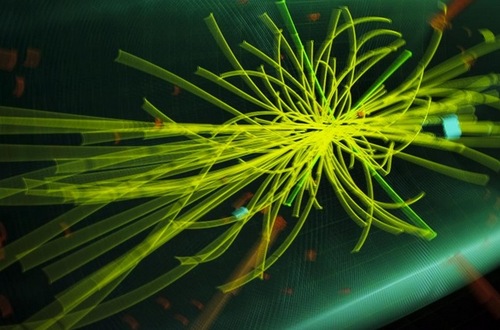The mind of a theoretical physicist must be a wonderful place. It can consider things that for me are only words, and will always be words. It can make play with multiple dimensions. It can contemplate black holes. It can not only theorize the existence of the Higgs boson, but can devise an experiment to find it–an experiment that succeeds.
This has been called the God Particle, but the one thing it doesn’t establish is the existence of God. It proves the existence of something that is capable of being observed by scientific experiment, and this something is said to account for the existence of matter.
Obviously you are not here today to learn anything useful from me about the Higgs boson. I am unqualified. What I am is a curious person who, like all thoughtful people possibly from the dawn of thought, have asked myself:
Why is there something instead of nothing?
The answer, “because God made it” reminds me infuriating things I was always being told as a child:
“It’s to make little boys like you ask questions.”
“That’s for me to know and you to find out.”
“Ask me no questions and I’ll tell you no lies.”
That answer is all the more unsatisfactory because there are so many different peoples and cultures, and they have so many definitions of God. What they’re really saying is, “There is something instead of nothing because my particular God made it.” From the Baltimore Catechism, I memorized the first words of the Apostle’s Creed: “I believe in God, the father almighty, creator of Heaven and Earth.” From Colossians, I learned he created “all things visible and invisible.” Why should I believe? The problem is that belief comes before a reason for belief.
Yet the Higgs boson is also inspires questions. Let us assume, as we are told by Lawrence Krauss in The New York Times, that “it makes even more remarkable the precarious accident that allowed our existence to form from nothing.” Yes, but why was there an accident instead of no accident? Krauss continues: “…if there exists an otherwise invisible background field permeating all of space, then the particles that convey some force like electromagnetism can interact with this field and effectively encounter resistance to their motion and slow down, like a swimmer moving through molasses. As a result, these particles can behave as if they are heavy, as if they have a mass.”
You and I behave as if we have mass. And therefore we have mass, because otherwise we wouldn’t behave that way.
I am in way over my head here, but these are the kinds of questions ordinary people wonder about. I am nothing if not ordinary. If you explain it as God, and Higgs explains it as his boson, what has been explained?
Here is where we get to the heart of the question. The scientific method has no interest in belief. What you believe is of interest only from an autobiographical viewpoint. Scientists (1) regard a phenomenon they would like to explain, (2) suggest a hypothesis to explain it, and (3) devise an experiment to test their hypothesis.
One enigma of matter in the universe, scientists found, is that there doesn’t seem to be enough of it. Since their observation of gravitational forces on celestial objects seems to make the missing matter necessary, they hypothesize the existence of matter they cannot see. They call it dark matter. Calling it “dark matter” does nothing to explain it, however.
Look again at Krauss’s words: “…if there exists an otherwise invisible background field permeating all of space…” If. If. There is the mind of the scientist. The existence of this invisible background field is a hypothesis, suggested by its effect on the visible. We can tell by our observations in the tangible world that something must be there. Common sense suggests it is smaller than anything we can see, even with our most advanced instruments. The scientific method suggests devising an experiment to look for it.
That is why the Large Hadron Collider was constructed outside Geneva. It accelerates particles through a 17-mile tunnel at such high speeds that when they collide their pieces might be visible. Not visible to the eye, of course, but to the most sophisticated tools we can devise. Krauss again: “Every second at the Large Hadron Collider, enough data is generated to fill more than 1,000 one-terabyte hard drives — more than the information in all the world’s libraries. The logistics of filtering and analyzing the data to find the Higgs particle peeking out under a mountain of noise, not to mention running the most complex machine humans have ever built, is itself a triumph of technology and computational wizardry of unprecedented magnitude.”
The importance of the experiment at CERN a few days ago is that it succeeded in finding that particle peeking out from under the mountain. As I understand computers, this discovery could not have been faked. Numbers went in, numbers came out, and the numbers indicated what the scientists predicted that would discover.
If they had not, that would have been a huge disappointment, coming at the end of such a magnificent and expensive experiment. The Collider is useful for many other experiments, but never mind: An explanation for mass in the universe would still have been lacking.
But it did not fail. It was an immense achievement, and a vindication of the scientific method, which began with a question asked by men since the dawn of thought, and found an answer using all of the tools and knowledge accumulated since. The answer is: There should be something there, it should resemble the infinitesimal particle called the Higgs boson, and with our experiment we have found it and proven that it exists.
My childhood question remains unanswered: “Why is there something and not nothing?” No scientist at Geneva, to my knowledge, has asked why there is a Higgs boson and not a Higgs boson? But they now know that there is something and not nothing, and they have seen it and identified it and named it and it is as they thought it would be. That is an enormous discovery to come during our lifetimes.
Already science is at work to keep on digging. Does the Higgs boson itself possess smaller particles? Why does it behave as it does? What would a universe look like without it? Would there be a universe? We can ask because of our human mind. Grasshoppers and giraffes don’t ask, which is of no consequence to the universe. Nor does the universe care about the Large Hadron Collider.
But we ask because our minds are curious, and human knowledge has evolved over countless years by asking, asking, asking. More than ever, supernatural explanations are unsatisfactory to me, because all they tell me is what you believe, or what you have been told. And if I were to ask you to devise an experiment? Your faith makes it unnecessary. It may even be a heresy.
I don’t understand the Higgs boson in the way a theoretical physicist does. What I know is that inside that mountain on the Swiss-French border, they went looking for something and they found it. They will keep on looking for centuries after we are dead. Maybe someday they will find God. Wouldn’t that be a gas? Whatever they find, they will find more and more and more. It’s not turtles all the way down.
The Krauss article: A Blip That Speaks of Our Place in the Universe.












